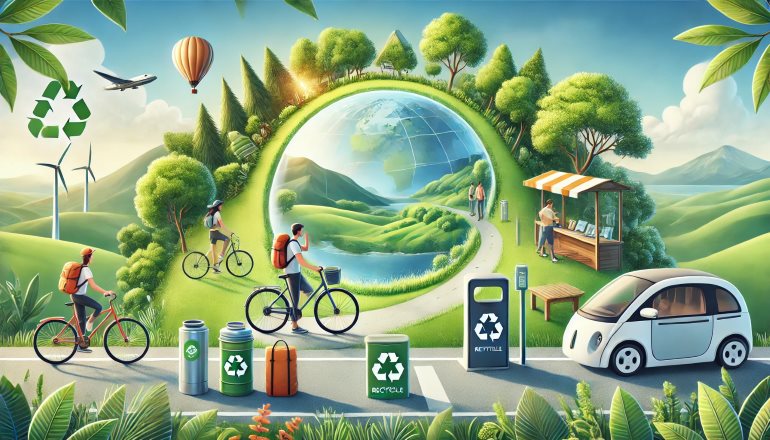In a world where travel is more accessible than ever, the way we explore matters. Ecotourism is more than just a trend—it's a commitment to responsible travel that benefits the environment, supports local communities, and preserves cultural heritage. Whether you're a traveler seeking meaningful experiences or a business looking to adopt sustainable practices, ecotourism offers a way to explore while making a positive impact.
What is Ecotourism?
Ecotourism is a form of responsible travel that focuses on conserving natural environments, respecting local cultures, and contributing to local economies. It goes beyond simply visiting a place—it’s about leaving it better than you found it. The core principles of ecotourism include:
✅ Minimizing environmental impact
✅ Supporting conservation efforts
✅ Respecting local cultures and traditions
✅ Empowering local communities
✅ Providing educational and immersive experiences
Types of Ecotourism
Ecotourism takes many forms depending on the environment and focus. Here are some key types:
🌊 Blue Tourism – Exploring the Ocean Sustainably
Blue tourism refers to marine and coastal tourism that prioritizes ocean conservation and responsible activities. Examples include:
- Diving & Snorkeling with Marine Conservation Initiatives (e.g., exploring coral reefs at Kisite-Mpunguti Marine Park in Kenya)
- Sustainable Beach Resorts that minimize waste and energy consumption (e.g., Mida Creek Eco Camp in Watamu)
- Eco-friendly Dhow Cruises that use wind power instead of motorized boats in Lamu
🌳 Forest & Jungle Ecotourism – Immersing in the Wild
This type of ecotourism focuses on exploring rainforests and woodlands while supporting conservation. Examples include:
- Canopy Walks & Wildlife Safaris in places like Kakamega Forest and Aberdare National Park
- Community-led Forest Conservation Tours in Arabuko-Sokoke Forest near Watamu
- Treehouse Lodges & Eco-Retreats like Oloirimbi Treehouse in the Maasai Mara, running on renewable energy
🏔 Mountain & Adventure Ecotourism – Thrills with a Green Touch
For those who love adventure, mountain ecotourism ensures that hiking, trekking, and climbing do not harm ecosystems. Key activities:
- Sustainable Trekking Routes like Mt. Kenya’s Sirimon and Chogoria trails with eco-lodges along the way
- Glacier Tourism with Climate Awareness at Mt. Kenya’s shrinking Lewis Glacier
- Eco-friendly Adventure Sports like zip-lining at Kereita Forest and rock climbing at Hell’s Gate National Park
🏜 Desert & Arid Land Ecotourism – Sustainable Exploration of Fragile Landscapes
Desert ecotourism promotes conservation and local culture in dryland areas:
- Eco-friendly Desert Camps using solar energy in Samburu and Turkana
- Camel Trekking with Nomadic Tribes among the Rendille and Samburu communities
- Sand Dune Conservation Tours in the Chalbi Desert
🏡 Community-Based & Cultural Ecotourism – Travel that Empowers Locals
This form of ecotourism directly benefits local communities and Indigenous cultures:
- Homestays & Village Tours offering authentic experiences (e.g., visiting the Maasai homesteads in Amboseli)
- Handicraft & Local Food Experiences supporting small businesses in Lamu and the Swahili Coast
- Cultural Heritage Preservation Projects like the restoration of Fort Jesus in Mombasa and the Kaya Forests of the Mijikenda
How Can We Support Ecotourism as Travellers?
🌍 Choose eco-certified accommodations (look for GSTC or ecotourism Kenya -certified hotels & lodges).
🚮 Minimize waste by using reusable water bottles, straws, and bags.
🐢 Respect wildlife by avoiding animal exploitation (no elephant rides, unethical dolphin encounters, etc.).
📖 Learn about local traditions and conservation efforts before visiting.
💰 Spend money at locally owned businesses, ensuring tourism dollars support communities.
How Can Businesses Promote Ecotourism?
🏡 Build and operate sustainable accommodations with energy-efficient practices.
🤝 Partner with local communities to offer authentic experiences.
🌿 Reduce environmental impact by minimizing waste, using renewable energy, and supporting conservation initiatives.
📣 Educate travellers through eco-friendly tours, workshops, and responsible tourism policies.
The Future of Ecotourism
Ecotourism isn’t just a niche—it’s the future of responsible travel. As travelers and businesses, we have the power to shape a world where tourism preserves nature, uplifts communities, and creates unforgettable experiences.
🌍 Will your next trip be an eco-friendly one? Let’s explore the world responsibly! ♻️✨
#Ecotourism #ResponsibleTravel #SustainableTourism #BlueTourism #TravelWithPurpose #ExploreKenya



